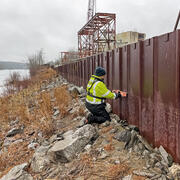Common Water Issues
Common Water Issues
Water Properties
Emerging Contaminants
Water Quality Topics
Droughts: Things to Know
Find water science information and activities related to popular water topics and problems.
Filter Total Items: 166
High-Water Marks
High-water marks are like footprints left behind by a flood — they show how high the water reached during a flood event. High-water marks serve as valuable data points for both educational purposes and scientific research, helping us understand past and recent flood events. Collecting this information is an essential and time-sensitive task for understanding flood risk and improving public safety.
Climate Response Network
The USGS groundwater Climate Response Network is a national network of wells selected to monitor natural groundwater-level conditions in unconfined or near-surface confined aquifers that are minimally affected by pumping or other human-induced stresses.
National Water Monitoring Network
To manage our water resources effectively, we need to understand how much water is available and its usefulness. The USGS monitors the nation’s water resources through various national observing networks that use a range of technologies and methods to assess real-time water conditions and predict future changes in water availability for human and ecological uses.
Linking Selenium Sources to Ecosystems: Understanding the Basis of Selenium Ecological Protection for Lake Koocanusa, a Transboundary Reservoir between Montana and British Columbia
This case-study of selenium pollution of Lake Koocanusa from coal mining in the upper Elk and Fording River watersheds relates to an overall goal of linking geologic source selenium dynamics to hydrological, biochemical, and ecological selenium dynamics. This type of approach enables a realistic understanding of the causes of uncertainty (for example, management alternatives for upstream selenium...
National Water Availability Assessments
The USGS National Water Availability Assessment consists of reports, which provide a scientific summary and interpretation of water quantity, quality and use, and the data companion, which delivers model-based estimates of water supply and demand.
Regional Water Availability Assessments
Regional Water Availability Assessments are scientific assessments of water availability in different hydrologic regions across the Nation. They are designed to capture a range of conditions in major drivers of water availability.
Integrated Water Availability Assessments
The USGS Water Resources Mission Area is assessing how much water is available for human and ecological needs in the United States and identifying where and when the Nation may have challenges meeting its demand for water.
Integrated Water Availability Assessments Fundamentals
The USGS Water Resources Mission Area is assessing how much water is available for human and ecological needs in the United States and identifying where and when the Nation may have challenges meeting its demand for water.
National Water Availability Assessment Data Companion
The National Water Availability Assessment Data Companion (NWDC) delivers model-based estimates of water supply and demand.
USGS National Streamgaging Network
As of October 2024, the USGS Groundwater and Streamflow Information Program supports the collection and (or) delivery of both streamflow and water-level information at 8,705 sites and water-level information alone at 3,460 additional sites. The data are served online—most in near real-time—to meet many diverse needs including the protection of life, property, the environment, and our economy.
Centennial Streamgages
Centennial Streamgages are USGS streamgages that have been in operation for more than 100 years.
National Atmospheric Deposition Program (NADP)
The National Atmospheric Deposition Program (NADP) is a collaboration of atmospheric monitoring networks. The purpose of the networks is to collect data to evaluate air quality. Network data also inform science-based actions to protect human health and preserve ecosystems for current and future generations. The NADP National Trends Network (NTN) quantifies the concentration of eight major ions and...















